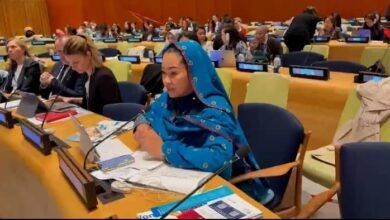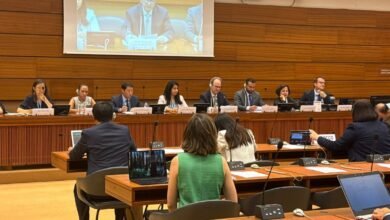King Mohammed VI Reaffirms Openness Toward Algeria, Upholds Firm Position on Autonomy Plan

By Karima Rhanem, Senior Global Managing Editor
In his 26th Throne Day address, His Majesty King Mohammed VI renewed his appeal for reconciliation with Algeria, underlining Morocco’s consistent diplomatic approach rooted in peaceful dialogue, regional cooperation, and sovereign clarity. At a time of regional uncertainties, the Monarch’s remarks reaffirm Morocco’s strategic patience and highlight its unwavering stance on the Moroccan Sahara, firmly anchored in the Autonomy Plan.

The King’s words were clear: Morocco remains open to dialogue with Algeria, despite strained diplomatic ties. “As King of Morocco, my position is clear and constant: the Algerian people are a brotherly people, bound to the Moroccan people by deep-rooted human and historical ties, and united by language, religion, geography, and a shared destiny” (Throne Day Speech, 2025). This deliberate tone of fraternity, reiterated over the years, stands in contrast to escalating tensions and misinformation often circulated in the media space.
A Diplomacy of Consistency and Restraint
Morocco’s approach to its bilateral relationship with Algeria has been shaped by a policy of continuity, refusing provocation while extending the hand of diplomacy. The Kingdom has repeatedly emphasized that open, direct dialogue—without preconditions—is the only path forward.
His Majesty’s 2022 Throne Day address (23rd anniversary) took a particularly symbolic stance on the sensitive matter of closed borders. “I stress once again that the borders dividing the Moroccan and Algerian peoples should never be borders that close off the channels of communication and understanding between them. Rather, we want them to be bridges for building the future of Morocco and Algeria, and setting an example for other peoples of the region.” By invoking the image of borders as “bridges,” the King was speaking beyond political institutions, appealing directly to the peoples of both nations, and framing regional integration as a shared, generational responsibility.
From Strategic Patience to Forward-Looking Engagement
In hindsight, the 2021 Throne Day Speech (22nd Anniversary) represented one of the clearest and most forward-looking expressions of Morocco’s willingness to turn the page with Algeria.
The King declared, “We renew our sincere invitation to our Algerian brothers to work together, without preconditions, to build bilateral relations based on trust, dialogue, and good neighbourliness.” His call was rooted not in political convenience but in a deeper belief that “Morocco and Algeria are more than two neighboring countries—they are twins, complementing one another.”
On the politically sensitive issue of the border closure, His Majesty said:
“I am convinced that open borders are the normal state between two neighboring countries and two sisterly peoples. The closure is inconsistent with a natural right and a legal principle enshrined in international covenants, including the Marrakesh Treaty establishing the Arab Maghreb Union.”
By pointing out that “neither I, nor the current Algerian President, nor the former one, are responsible for the decision to close the borders,” the King anchored the debate not in blame but in collective responsibility—“before God, before history, and before our citizens.”
The Firm Pillar: The Moroccan Sahara
While Morocco extends its diplomatic overtures, it remains steadfast on matters of sovereignty. The Autonomy Plan—presented by Morocco in 2007 as a political solution to the regional dispute over the Moroccan Sahara—remains at the heart of its foreign policy.
His Majesty’s discourse consistently reflects this reality: Morocco welcomes cooperation, but never at the expense of its territorial integrity. The tone is not one of confrontation but of determination: sovereignty is not a matter for negotiation, yet regional peace and cooperation are always open for discussion.
By aligning Morocco’s development vision with its international partnerships and principled diplomacy, the Monarch reinforces that recognition of the Moroccan Sahara under the Autonomy Plan is growing globally—not through coercion, but through credibility.
Toward a Renewed Regional Cooperation
The King’s latest call for Maghreb unity echoes his long-standing belief in the importance of the Arab Maghreb Union. In his 2025 address, he reiterated:
“We reaffirm our commitment to the Maghreb Union, convinced that its revival cannot be achieved without the involvement of Morocco and Algeria.”
This message transcends bilateral ties. It is a strategic vision for North Africa—an invitation to turn the page on missed opportunities and advance toward economic integration, security cooperation, and shared progress.
Through a coherent diplomatic narrative spanning several years, His Majesty King Mohammed VI has set the foundation for a regional policy that values peace over provocation, clarity over ambiguity, and fraternity over hostility. From his 2021 and 2022 speeches to this year’s address, the King has shown that Morocco’s hand remains extended—not as a gesture of weakness, but as a demonstration of principled strength.
In a volatile geopolitical context, the Kingdom’s approach is deliberate: reinforce internal cohesion, defend sovereignty with dignity, and build regional bridges where others see only barriers.
Karima Rhanem is Senior Global Managing Editor of Maghreb Strategic Insights and President of The International Center for Diplomacy. She specializes in Moroccan foreign policy, regional cooperation, and public diplomacy




